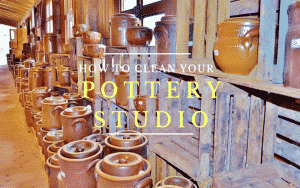As creative individuals, we are always full of new goals for our ceramic business — whether it’s aiming for a certain level of sales, getting that new website up and running, starting a newsletter, or all of the above!
We love what we do and we want to succeed at making pottery our living. Running a ceramics business is no small feat, and as artists we often find ourselves wearing many hats; we’re product designers and makers, marketers and accountants, one-person shipping departments, and more. And while all of these things are necessary for success and managing them all can give us greater control over the direction of our business, if not balanced effectively they can lead to maker burnout.
In today’s article we’re going to discuss just what burnout is, and offer some handy tips to avoid it so you can continue to enjoy your practice!
What exactly is burnout anyways?

You may have heard this term thrown about quite a bit in the media as of late. It’s no surprise given the precarious economic climate and the neverending pressures (both socially and economically) to be productive. According to the American Psychological Association (APA) burnout is at an all-time high across numerous professions, spurred on by the COVID-19 pandemic and the potent mix of personal, professional, and health-related stress.
Most of us understand that burnout is a form of exhaustion, but in order to avoid this harmful condition, it’s important to recognize that it is not quite so simple. Burnout is actually a syndrome recognized by the World Health Organization (WHO) as an ‘occupational phenomenon’. It results from chronic workplace stress that has not been successfully managed, and it is characterized by three dimensions:
- Feelings of energy depletion or exhaustion
- Increased mental distance from one’s job, or feelings of negativism or cynicism related to one’s job
- Reduced professional efficacy, including increased procrastination, taking longer to do tasks, and increased self-doubt surrounding your working abilities.
Crucially, the effects of burnout go far beyond your work situation. While your work may suffer, burnout can extend into every part of your life and drastically increase the likelihood of a variety of serious medical conditions. These can include the development of anxiety, insomnia, or depression, as well as increasing the risk for physical illnesses such as high blood pressure, heart problems, high cholesterol, and diabetes.
Causes of Burnout
We mentioned that burnout is the result of prolonged workplace stress, but what are the specific causes of such stress? Often it’s caused by a combination of factors at work, including things such as challenging workplace relationships, financial stress, long hours, lack of workplace support systems, hazardous working conditions, and more. This state of stress can be compounded by stresses outside of work, such as caregiving responsibilities, poor health, or relationship challenges.
As self-employed workers, ceramic artists face a number of known work-place stresses. These include a very high workload, isolation, financial instability, and a high level of responsibility across a range of roles. We also commonly face the social stigma that goes along with being artists, where it is expected that we will be poor, that our work isn’t ‘real’ work, and that our prices are not justified. These factors add the extra pressure of justifying what we do to our families, community, and broader society.
How to Avoid Burnout as a Ceramic Artist
While it’s important to recognize the risks and symptoms of burnout, don’t let the fear of it add to your stress! Knowing what symptoms to watch for, along with implementing a few simple strategies, can help you avoid it. Life will always throw us some curveballs, so it’s impossible to avoid stress completely, but by following these tips you can reduce your risk of burnout and maintain your enthusiasm for your ceramics career.

1. Delegate
As we mentioned at the top of this article, it’s very common for us to take on many roles to run our ceramics business. In addition to making and designing our work, we are grant writers, educators, accountants, advertisers, social media managers, and more! Few other businesses operate this way, but within the art world it has become common practice, often to the detriment of our health. We often use our lack of financial resources to talk ourselves out of paying for support, but this isn’t necessarily the best long-term strategy for our health, or even from a practical business standpoint. If you are feeling pulled in too many directions, have a look at the structure of your business to find tasks that you can pass on to others.
In her 30 Days Workshop as part of the Ceramic School’s Business Conference, Naomi Clement refers to her practice of identifying areas of genius, excellence, and incompetence as a means of deciding how to delegate. Your areas of excellence are the things you are uniquely talented at, and these are the places you should invest the most energy. Your areas of incompetence, on the other hand, are areas where you lack skill, training, or enjoyment. These latter areas are where you should begin to outsource your labor, as they will be particularly draining and stressful. For many artists this can look like hiring an accountant, a website designer/manager, or working with a gallery rather than doing direct sales.

2. Set Boundaries
As artists, it’s very difficult to turn away opportunities. It can be a challenging road to making a career in clay, and every chance to exhibit, teach, donate to fundraisers, do a custom order, or give an artist talk can feel like an important step forward in our career. And of course, these opportunities can be very fruitful and they’re worth engaging with. But it is important to recognize that we are creatures of limited energy, resources, and time, and we simply cannot say yes to every offer that comes along.
When you are faced with a new career-related request, take some time to consider it before giving that immediate ‘yes.’ Do you have the space in your calendar for it? How much time/energy will it take? Will it actually be of benefit long-term? Will you enjoy it? If a particular opportunity doesn’t excite you and has little benefit, don’t hesitate to say no. Other things will always come along, and it’s better to save space for the things that add real value to your practice and career. Plus, when you over commit yourself, you are more likely to under deliver, which is worse for everyone involved!
Saying ‘no’ can also be advantageous for your business. If you are so popular that you have to turn people down, it shows how in-demand you and your work are, which serves to increase desirability!

3. Pay Yourself Properly
One of the main workplace stresses that contributes to burnout is over-work. As artists, this can happen because we love what we do so much that we neglect other things, but it can also happen because we are underpricing our work and are therefore having to produce much more of it to make ends meet. And while it can be great for the ego to have so many orders that you can’t rest, it’s definitely not sustainable.
To avoid overwork due to poor pricing, have a realistic look at the number of hours that you can healthily work in a week, and based on that, determine the hourly wage you need to maintain the lifestyle you want. Measure the average number of pieces you can make in a week working at a comfortable pace, remembering to add in your average monthly operating costs. Consider that it is often more worthwhile to have fewer clients with higher prices, than the other way around.
This will all help you make a more informed decision about your pricing and the number of orders you can realistically take on. Don’t forget to add room for sick days and holidays, as you are entitled to these just as other workers are, and they are also important for avoiding burnout!

4. Take Breaks
This one can be a tricky one for us potters as once we’re in a good groove it can be hard to pull ourselves away! At other times, we may be in the middle of a complex construction process where it’s not practical to stop midway through. Despite these challenges, taking breaks is invaluable for managing stress, and it’s important to remember that even a short 5 minute break can make a big difference. In a regular workplace we’d have scheduled breaks at regular intervals, but due to the nature of the ceramics process, this is not always realistic. If that’s the case for you, make a conscious effort to take a break every time you are shifting tasks. Finished throwing and going to load a kiln? Take a break in between. Finished trimming and going to pull handles? Another break. Not only will this offer physical benefits, but it will give your mind space to reset and prepare for the next process.
If you are doing a session with a long, involved process, be sure to pay extra attention to your body for cues to take a break. In these situations we can often remain in the same position for too long, or be overly focused and neglect ourselves. If you can’t physically walk away without risking the piece, taking a moment to simply stretch and reposition can make a big difference.

5. Seek Support and Community
As ceramic artists it’s not uncommon for us to work alone, and while this can have many benefits (particularly for the introverts among us), it can also lead to feelings of isolation. These feelings can be exacerbated when we are facing challenges and are struggling to problem solve.
A great way to beat the isolation is to build your ceramic network. Having connections to other artists can give you support from people who have been through the same challenges, and can also give you a community to share your successes with, which is equally valuable. Consider connecting with a local shared studio, guild, or arts council, and participate in social arts events when you can. If there is a lack of opportunities in your area, there are plenty of online communities to turn to as well, including, of course, The Ceramic School!
It’s also important to not neglect your other social relationships. It’s easy to feel guilty for not showing up to the studio every day, but having a fun social outlet and close confidants to whom we can vent are important parts of maintaining the energy needed for effective and joyful work. Remember, your work will be better when you are feeling good inside AND outside of the studio.

6. Celebrate Your Achievements
As artists, we are always our own worst critics, and it can be easy to focus on where we want to go, rather than how far we’ve come. By celebrating our achievements, no matter how big or small, we remind ourselves that we are indeed doing what we love, and doing it well! So whether you just completed your first solo show, or you finally managed to do those taxes that you were procrastinating on, give yourself a pat on the back, and share your achievement with those close to you!

7. Self Care
What we do outside of our career can be just as important for managing our stress as what we do at work. Ensuring we get adequate sleep, eat healthy, have daily downtime, and exercise, all go a long way in helping to maintain overall health and energy, and cope with stress. These considerations may seem obvious, but they are often the easiest to neglect in the chaos of modern life.

Final Thoughts
Burnout is an increasingly common problem in today’s society, and it’s important to be aware of its symptoms and risks, especially as self-employed artists who have less financial security and employment-based safety nets in place. We’re confident that, armed with a bit of knowledge, you can take steps to reduce the risks, and set yourself up to have a long and healthy creative career. By delegating tasks, setting boundaries, and paying yourself well, you are already well on your way to maintaining healthy stress levels within your practice. Add in some self care and celebration and you’ll be sure to have many happy years of creativity ahead of you!
If part of your ceramic business related stress is from being overwhelmed with just how to make it all work, why not sign up for our Pottery Business Conference? We’ll take the mystery out of how to go about starting your ceramics career, giving you valuable tips on how to do important tasks like marketing, shipping, and working with galleries.






Responses